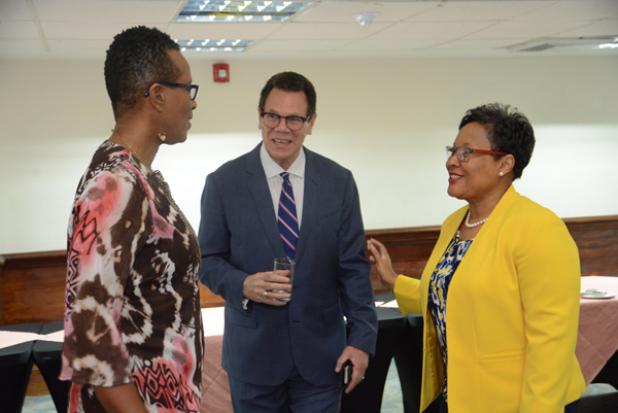
From left: Dr. Annalee Babb, Special Envoy and Advisor to the Ministry of Innovation, Science and Smart Technology, in conversation with President of the Caribbean Development Bank, Dr. Warren Smith; and Chief Executive Officer of the Small Business Association, Senator Lynette Holder.
Full potential of MSMEs unrealised, says CDB president
Even though Micro, Small and Medium-sized Enterprises (MSMEs) contribute 50 per cent of GDP and create 45 per cent of the jobs in the Caribbean region, “their full potential remains unrealised”.
President of the Caribbean Development Bank (CDB), Dr. Warren Smith, voiced this lamentation while outlining that MSMEs should be major contributors to islands’ exports.
“Certainly if our MSMEs are operating efficiently, then it would be reasonable to assume that they are competitive and have the potential to export,” he argued, insisting it was time to unravel those issues preventing them from operating more efficiently, more productively and more competitively.
“If we understand the constraints, we can design workable solutions to unleash this potential and create a business environment in which MSMEs can grow and flourish in a well-functioning market economy,” he stated.
As he spoke at the Lloyd Erskine Sandiford Centre at the State of the Micro, Small and Medium-sized Enterprises Sector in CARICOM Conference recently, Smith identified that weak enabling environment; high energy and other production costs; limited and poor product/service quality and standards; and limited access to both loan and equity finance were the principal limiting factors constraining MSMEs from realising their full potential.
Speaking on the low ranking Barbados and the Caribbean hold in the recent World Bank’s Doing Business survey – an average of 126 out of 190 countries, he said this was due to inadequate legislative and regulatory frameworks; weak public sector institutions for providing legal protection; and inefficient business support and training services.
In addition, Smith insisted the prolonged delays in implementing agreements reached under the Revised Treaty of Chaguaramas were adding to island states’ low ranking.
“Market access has not improved despite the removal of over 450 legal and administrative barriers to the free movement of goods, services, capital and labour in most CARICOM countries. The establishment of a single jurisdiction to allow for the equal treatment of business entities across CARICOM is outstanding; and a CARICOM business must still register in every jurisdiction in which it wishes to operate! And alien landholding licensing requirements are still in place. Then, most of the 12 participating CSME countries have failed to enact the requisite legislation that would allow the free movement, of even the ten categories of persons that now have the right to seek employment in other CARICOM member states without the need for a work permit. These are restrictions which add to the cost and slow pace of doing business, and hamper the extent to which CARICOM businesses can penetrate regional markets,” he added.
Smith therefore told regional governments to scale up their efforts to create a policy and institutional framework that responds appropriately to the characteristics and special needs of MSMEs.
“Are the tax regimes and regulatory requirements making compliance costs too burdensome? Or are they incentivising SMEs to remain in the informal sector? Priority must be given to cutting red tape; increasing the transparency and the cost-efficiency of regulations; collecting data on a systematic basis; and adopting stronger evidence-based policies,” he stressed. (JMB)
